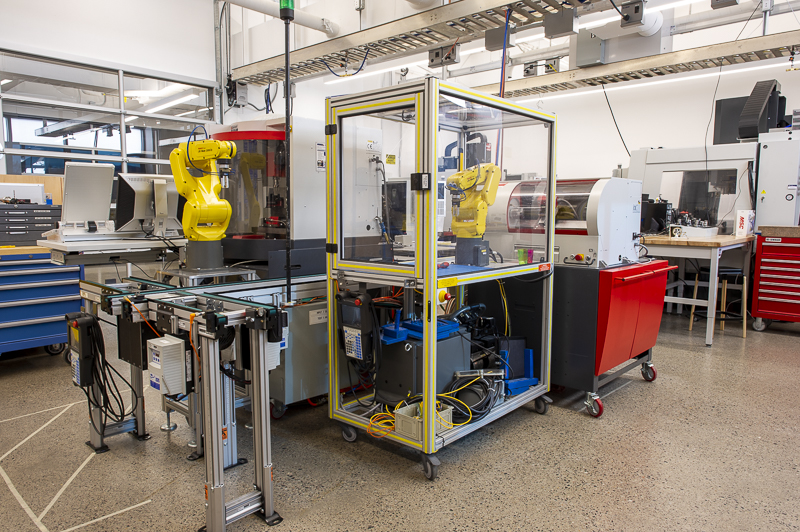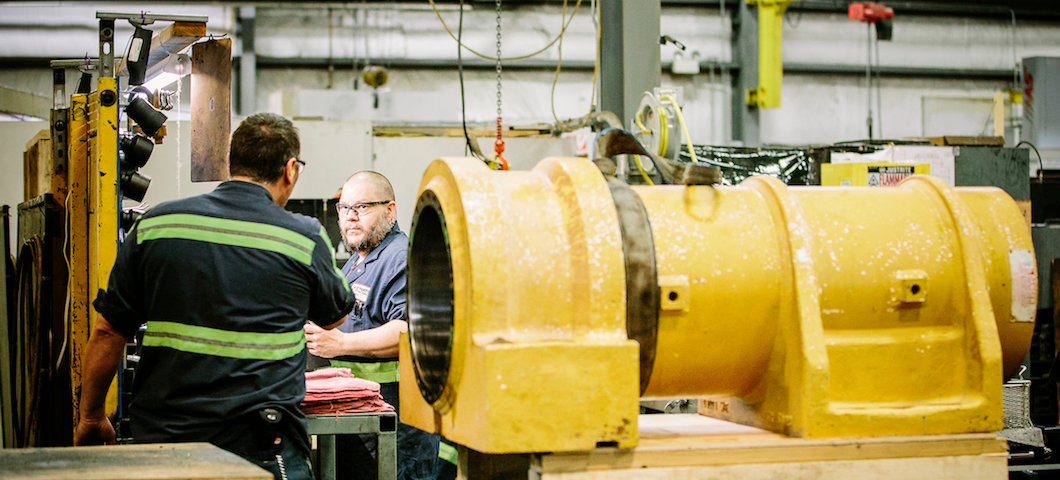Masters of Engineering in Manufacturing Engineering
Make a difference in the world by applying advanced engineering thinking to complex real-world problems. Our graduate programs strive for engineering solutions that are responsive, compatible and sustainable.
HOW TO APPLY
Complete and submit your Graduate School Application.
Program Overview
The Master of Engineering in Manufacturing Engineering program is designed to prepare students from multiple disciplines to enter the workforce in an advanced manufacturing position using a synchronous mode of teaching. This program provides training to professionals with a desire to build their skills in advanced and emerging manufacturing technologies in order to grow their professional careers. The program focuses on building advanced skills in the science of manufacturing processes across a wide spectrum of topics. Most notably, topics include automation, quality, efficiency, and management systems, thus enabling integration of complicated manufacturing systems.
View the Manufacturing Engineering Course Catalog
Course-work Only
The Master of Engineering in Manufacturing Engineering is a non-thesis program for students concentrating in an area of study.
- Rather than completing a research thesis or professional paper, students in this program focus on completing 30 course credits. This typically occurs within 12-24 months, but is possible to complete within two sequential semesters. Required courses are taught in a synchronous mode to allow working professionals the flexibility to progress within the program without commuting to campus. Elective courses are delivered in various sychronous teaching modalities with more real-time virtual options coming online every semester.
- This program is well suited for students continuing directly from a bachelor's degree who want less focus on research, as well as practicing engineers seeking additional credits toward professional licensure.
General Requirements
- 30 credits total
- At least 21 of the total credits required for degree must be at 5xx level
- 3xx level courses are not allowed
- 4xx level courses may be used (maximum allowed is 9 credits)
- Courses with grades below C cannot be used to satisfy graduation requirements
- Three credits (min.) registration required during term of graduation
| Required Courses | Credits | |||
|---|---|---|---|---|
| The following courses are required for every MEng-Manufacturing Engineering Student: | (12 credits) | |||
| EGEN 501 | Principles of Manufacturing | 3 | ||
| EGEN 515 | Industrial Internet of Things | 3 | ||
| EMAN 525 | Manufacturing Management Systems | 3 | ||
| EMAN 571 | Manufacturing Automation and Control | 3 | ||
| Approved Elective Courses: | (18 credits) | |||
| Manufacturing Engineering (only one of these options is allowed): | ||||
| EMAN 575 | Research or Prof Paper/Project (Research or Project Project/Paper) | |||
| EMAN 592 | Independent Study | |||
| EMAN 598 | Internship | |||
| Mechanical Engineering Technology: | ||||
| ETME 410 | Computerized Numerical Control and Computer-aided Manufacturing Technology | |||
| ETME 415 | Design for Manufacturing and Tooling | |||
| ETME 462 | Industrial Processing Automation and Controls | |||
| Industrial Engineering: | ||||
| EIND 425 | Technology Entrepreneurship | |||
| EIND 434 | Project Management for Engineers | |||
| EIND 442 | Facility and Material Handling Systems Design | |||
| EIND 458 | Production and Engineering Management | |||
| EIND 477 | Applied Statistical Quality Control | |||
| EIND 500 | Engineering Organizational Change and Innovation | |||
| EIND 509 | Systems Simulation | |||
| EIND 511 | Advanced Human Factors | |||
| EIND 513 | Human Factors in Complex Systems | |||
| EIND 525 | Multi-Criteria Decision Making and Optimization | |||
| EIND 554 | DOE for Engineers | |||
| EIND 557 | Regression and Multivar Analysis | |||
| EIND 558 | Manage Forecast and Dec Analysis | |||
| EIND 574 | Management Engineering Systems | |||
| Mechanical Engineering: | ||||
| EMEC 444 | Mech Behavior of Materials | |||
| EMEC 462 | System Dynamics and Control | |||
| EMEC 467 | Micro-Electromechanical Systems | |||
| Electrical Engineering: | ||||
| EELE 407 | Intro To Microfabrication | |||
| EELE 408 | Photovoltaic Systems | |||
| EELE 409 | EE Material Science | |||
| EELE 422 | Intro to Modern Control | |||
| EELE 505 | MEMS Sensors and Actuators | |||
| Materials Engineering: | ||||
| EMAT 462 | Manufacturing of Composites | |||
| EMAT 463 | Composite Materials | |||
| EMAT 464 | Biomedical Materials Engineering | |||
| EMAT 550 | Failure of Materials | |||
| EMAT 552 | Advanced Ceramics | |||
| EMAT 553 | Advanced Composite Materials | |||
| EMAT 560 | Polymeric Materials | |||
| General Engineering: | ||||
| EGEN 505 | Advanced Engineering Analysis | |||
| Engineering Mechanics: | ||||
| EM 560 | Finite Elem Analysis in Engr | |||
| Chemical Engineering: | ||||
| ECHM 451 | Chemical Engineering Process Dynamics and Control | |||
| ECHM 510 | Reaction Engineering/Modeling | |||
| Computer Science: | ||||
| CSCI 441 | Computer Graphics | |||
| CSCI 446 | Artificial Intelligence | |||
| CSCI 447 | Machine Learning | |||
| CSCI 455 | Embedded Systems: Robotics | |||
| CSCI 546 | Advanced Artificial Intelligence | |||
| CSCI 547 | Advanced Machine Learning | |||
| Total Credits: | 30 | |||
Labs and Resources

Microfabrication Facility
The Montana Microfabrication Facility (MMF) at Montana State University is an open-access micro- and nanofabrication lab in Bozeman. It is part of the Montana Nanotechnology Facility (MONT), an NNCI site, alongside the Center for Biofilm Engineering (CBE), the Imaging and Chemical Analysis Laboratory (ICAL), and the Mass Spectrometry Facility.

CIM Lab
Located in 136 Barnard Hall, the CIM Lab offers hands-on learning in industrial automation, robotics, and CNC machining. Equipped with industry-standard software, robotic systems, CNC machines, and an automated conveyance system, it supports students, faculty, and staff in developing real-world manufacturing skills through projects and research.

Bill Wurst Makerspace
The Bill Wurst Makerspace offers the MSU community a centrally located, inclusive environment for innovation, experimentation, and prototyping. Open to students, faculty, and staff, it provides state-of-the-art tools, expert mentorship, and valuable resources for academic projects, research endeavors, and personal creative pursuits.
More Resources
Measurements and Instrumentation Lab
- The Measurements and Instrumentation Laboratory houses many basic sensors and instrument types to support coursework in the Mechanical Engineering and Mechanical Engineering Technology programs. Students utilize apparatus ranging from simple digital multi-meters and manometers to computerized data acquisition systems and digitizing oscilloscopes. These devices can be used to monitor all kinds of engineering testing and phenomena. ME and MET laboratory experience prepares students for the subsequent courses, project activity in measurements and instrumentation, and possible measurement applications in their engineering careers.
3D Printers Via Makerspace
- 3D printing FAQ
- Images of provided 3D printers
Machining Lab
Laboratories, Equipment and Tooling
Montana Manufacturing Extension Center

Provides Certified Manufacturing Associate Apprenticeship's
Norm Asbjornson College of Engineering Faculty
Connect with the dedicated faculty and staff in your department, who are committed to supporting your academic and professional growth. Engage with experts in your field and access valuable mentorship, guidance, and resources.
Life in Bozeman
Known for its high quality of life and regularly featured on national "Best Places" lists, Bozeman combines a vibrant downtown, walkable and bikeable neighborhoods, and easy access to nearby mountains and rivers. Learn more.

